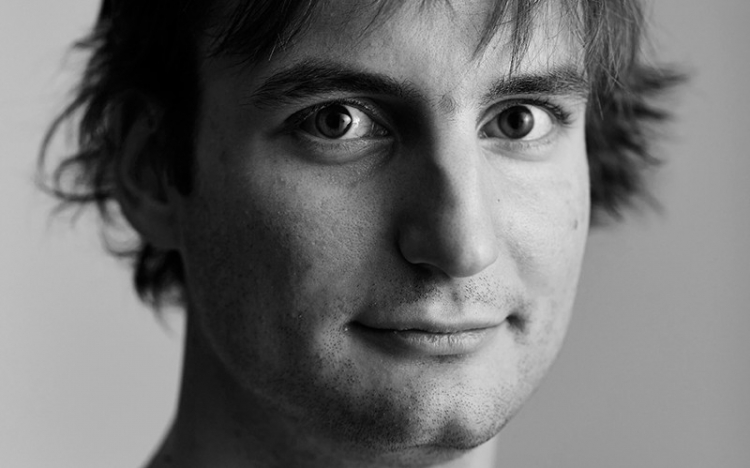
Family Film by Olmo Omerzu, a young Slovenian director with a background in Czech film, intrigued the festival audience with its unusual but readable film narrative. Members of a seemingly perfect family from Prague are going through sudden situations in life that change them emotionally forever – both as individuals and as a family. And as a dog. Read the interview Nino Kovačić did with the director and a kind reminder: one of the screenwriters, Nebojša Pop Tasić, will appear as a special guest at this evening’s screening of Family Film at Europa Cinema, 9.30pm.
How did the idea you got from a news story about a shipwrecked dog evolved to become a film about a ‘shipwrecked’ family?
In my head I had a picture of a dog, a pet, who found itself shipwrecked on a deserted island like Robinson. First I started to write down island scenes and wondered about the dog’s destiny and a prequel to this dog’s story. I was interested in who its owners are and what they are doing while their dog is fighting for survival. I wrote the script together with Nebojša Pop-Tasić; we break the family down into pieces and then we are trying to put it back together again. In the process, the dog becomes an emotional catalyst of their problems. The film came about as an impulse to revisit the role of family in the present times.
Your idea of a ‘family’ film is a bit odd. Could it be called an ‘anti-family’ film in a way, given that the perfect family from the beginning falls into gradual decay?
I took up Family Film primarily because I wanted to establish what family values in today’s society are. An anti-family film might be a tad too harsh, but the truth is that family is slowly dying. Finally I nevertheless offer a certain solution, albeit not a happy one, more of a realistic kind: in reuniting with their half-dead dog they in a way get a mirror image of themselves.
Although the story focuses on young Erik for a while, he cannot be called a true protagonist. Are incidents beyond our control that shape family situations in fact what you consider most important for a story?
There is no central character and every family member seems equally important and more or less in the spotlight at certain moments in the film. I wanted the dog to be a metaphor of family as such, not the represent one particular character.
The film works on several levels: as a coming-of-age story, a family drama, a poetic essay. What made you opt for such a fragmented approach, with a narrative distributed on individual characters?
Throughout the story I wanted to decompose and recompose the family as a possible working unit several times. In order to scratch beneath the surface, I divided the screen family into thematic units. At the beginning we see all its members in the smallest possible space, in a car, which in a way represents the family atmosphere of the stifling everyday. Then there are chapters about children without parents, about parents without children and about a dog that lost a family. In every part of the film, which differ in genre, there is always a moment most important for the development of the storyline: absence. The motif of absence, whose ‘lack’ is self-warning and creates a subtext to the given situations, is the most interesting part to me in the entire film.
You play with the audience’s expectations after you put the characters in situations of extreme personal turmoil. Was that an internal impulse and a challenge in filmmaking?
I believe such narrative twists and turns somehow make it up for the fact that the audience finds it hard to identify with characters who are (in a narrative sense) somewhat distant. More than identification and films with a ‘central protagonist’, I am interested in creating a sense of unease and alienation in certain situations.
Family Film is coming to Zagreb after it already appeared at festivals in San Sebastian, Tokyo and elsewhere. Were the audience responses similar?
So far it has been received well everywhere. The topic is universal enough that, despite the unusual narrative structure, the film finds its way to the audience across the world.
Was it demanding to direct a film produced by as many as five countries?
My producer Jiři Konečny and myself designed a production scheme very carefully, so I didn’t have to compromise to the expense of the film. I alone don’t have a problem working with an international filmmaking crew.
It seems you do well in the Czech cinema. Could we call you a Czech director?
In Czech Republic they occasionally call me a Slovenian-born Czech director. I don’t have a problem with such description because so far I have filmed only in the Czech territory and language.
You are already working on your next film. What can we expect?
Kavky na cestĕ is an untypical coming-of-age road movie, I see it as a storytelling film. There is a Rashomonic quality in the narrative and the coming-of-age theme, with an unusual denouement.
